The Daily Readings
MONDAY, August 31, 2020
Psalm 83:1-4, 13-18; Exodus 4:10-31; Revelation 3:1-6
The Holy Bible, King James Version (KJV)
Today's Verse-of-the-Day: Psalm 95:6-7
O come, let us worship and bow down: let us kneel before the Lord our maker. For he is our God; and we are the people of his pasture, and the sheep of his hand.
Today's Readings:
God’s power like blazing fire
1 Keep not thou silence, O God: hold not thy peace, and be not still, O God.
2 For, lo, thine enemies make a tumult: and they that hate thee have lifted up the head.
3 They have taken crafty counsel against thy people, and consulted against thy hidden ones.
4 They have said, Come, and let us cut them off from being a nation; that the name of Israel may be no more in remembrance.
13 O my God, make them like a wheel; as the stubble before the wind.
14 As the fire burneth a wood, and as the flame setteth the mountains on fire;
15 So persecute them with thy tempest, and make them afraid with thy storm.
16 Fill their faces with shame; that they may seek thy name, O Lord.
17 Let them be confounded and troubled for ever; yea, let them be put to shame, and perish:
18 That men may know that thou, whose name alone is Jehovah, art the most high over all the earth.
Moses doubts but obeys God
10 And Moses said unto the Lord, O my Lord, I am not eloquent, neither heretofore, nor since thou hast spoken unto thy servant: but I am slow of speech, and of a slow tongue.
11 And the Lord said unto him, Who hath made man's mouth? or who maketh the dumb, or deaf, or the seeing, or the blind? have not I the Lord?
12 Now therefore go, and I will be with thy mouth, and teach thee what thou shalt say.
13 And he said, O my Lord, send, I pray thee, by the hand of him whom thou wilt send.
14 And the anger of the Lord was kindled against Moses, and he said, Is not Aaron the Levite thy brother? I know that he can speak well. And also, behold, he cometh forth to meet thee: and when he seeth thee, he will be glad in his heart.
15 And thou shalt speak unto him, and put words in his mouth: and I will be with thy mouth, and with his mouth, and will teach you what ye shall do.
16 And he shall be thy spokesman unto the people: and he shall be, even he shall be to thee instead of a mouth, and thou shalt be to him instead of God.
17 And thou shalt take this rod in thine hand, wherewith thou shalt do signs.
18 And Moses went and returned to Jethro his father in law, and said unto him, Let me go, I pray thee, and return unto my brethren which are in Egypt, and see whether they be yet alive. And Jethro said to Moses, Go in peace.
19 And the Lord said unto Moses in Midian, Go, return into Egypt: for all the men are dead which sought thy life.
20 And Moses took his wife and his sons, and set them upon an ass, and he returned to the land of Egypt: and Moses took the rod of God in his hand.
21 And the Lord said unto Moses, When thou goest to return into Egypt, see that thou do all those wonders before Pharaoh, which I have put in thine hand: but I will harden his heart, that he shall not let the people go.
22 And thou shalt say unto Pharaoh, Thus saith the Lord, Israel is my son, even my firstborn:
23 And I say unto thee, Let my son go, that he may serve me: and if thou refuse to let him go, behold, I will slay thy son, even thy firstborn.
24 And it came to pass by the way in the inn, that the Lord met him, and sought to kill him.
25 Then Zipporah took a sharp stone, and cut off the foreskin of her son, and cast it at his feet, and said, Surely a bloody husband art thou to me.
26 So he let him go: then she said, A bloody husband thou art, because of the circumcision.
27 And the Lord said to Aaron, Go into the wilderness to meet Moses. And he went, and met him in the mount of God, and kissed him.
28 And Moses told Aaron all the words of the Lord who had sent him, and all the signs which he had commanded him.
29 And Moses and Aaron went and gathered together all the elders of the children of Israel:
30 And Aaron spake all the words which the Lord had spoken unto Moses, and did the signs in the sight of the people.
31 And the people believed: and when they heard that the Lord had visited the children of Israel, and that he had looked upon their affliction, then they bowed their heads and worshipped.
Wake up to your faithlessness
1 And unto the angel of the church in Sardis write; These things saith he that hath the seven Spirits of God, and the seven stars; I know thy works, that thou hast a name that thou livest, and art dead.
2 Be watchful, and strengthen the things which remain, that are ready to die: for I have not found thy works perfect before God.
3 Remember therefore how thou hast received and heard, and hold fast, and repent. If therefore thou shalt not watch, I will come on thee as a thief, and thou shalt not know what hour I will come upon thee.
4 Thou hast a few names even in Sardis which have not defiled their garments; and they shall walk with me in white: for they are worthy.
5 He that overcometh, the same shall be clothed in white raiment; and I will not blot out his name out of the book of life, but I will confess his name before my Father, and before his angels.
6 He that hath an ear, let him hear what the Spirit saith unto the churches.
Optional parts of the readings are set off in [square brackets.]
The Bible texts of the Old Testament, Epistle, and Gospel lessons are from The Holy Bible, King James Version (KJV).
The Daily Bible Readings are selected from the Revised Common Lectionary Daily Readings, a three-year cyclical lectionary. We are currently in Year A. Beginning with the first Sunday of Advent in 2020, we will be in Year B. The year which ended at Advent 2019 was Year C. These readings complement the Sunday and festival readings: Thursday through Saturday readings help prepare the reader for the Sunday ahead; Monday through Wednesday readings help the reader reflect and digest what they heard in worship. Revised Common Lectionary Daily Readings, copyright © 2005 Consultation on Common Texts. www.commontexts.org
The Daily Readings for MONDAY, August 31, 2020
Psalm 83:1-4, 13-18; Exodus 4:10-31; Revelation 3:1-6 (KJV)









